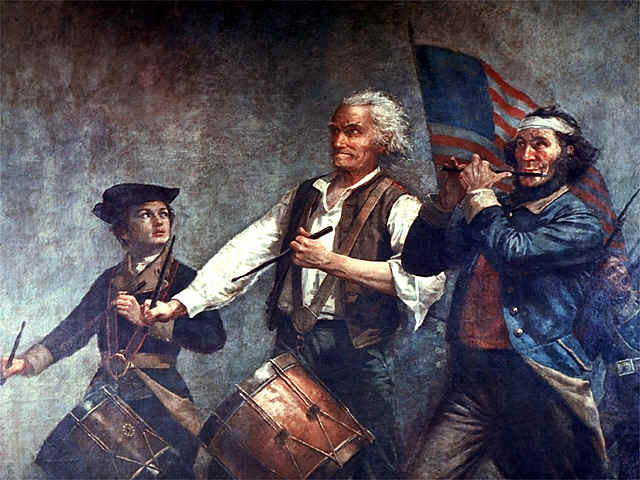1727 – 1781
(Family
Lineage: 1 Joshua Fairbanks; 2 John Fairbanks;
3 Theophilus Fairbanks; 4
Elizabeth Fairbanks; 5
Sarah Elizabeth Lane; 6
Estella Elizabeth Foss; 7 Harold
Victor Hayward; 8
Judith Ann Hayward)
This
plaque was erected by the Capt. Job Knapp Chapter of the Daughters of
the American Revolution in 1923. It reads: “Old
Boston-Hartford Turnpike Douglas Center Cemetery;
Erected
in memory of forty-six soldiers of the American Revolution who are
buried here.
They endured hardship and death for freedom and
independence.”
Joshua Fairbanks was one of the
soldiers honored on this plaque. His family had deep roots in
America, going back into the 1600s. His mother, Hannah Coolidge, was born in
Massachusetts in 1692. His father, Jonathan, was a second generation
American physician who served in the French and Indian War and built
a large home in Dedham, Massachusetts which is now known as the “Fairbanks
House Museum”and open to the public.
Joshua's wife, Lydia Ellis, was the
great-great-granddaughter of Henry Adams and second cousin of John
and Samuel Adams. Joshua and Lydia were married in 1753 and had 9
children, several of whom also fought in the War.
Before his marriage, Joshua was
elected as a Selectman in Douglas, Massachusetts. This group was
composed of unhappy patriots who were greatly disturbed by the
continuing imposition of unfair taxes by the British. To make matters worse, there were well-documented atrocities by officers of the crown
who threw some of the local people into slavery and bondage for minor infractions.
In 1774, Joshua participated in
reorganizing the local Douglas militia, which was soon incorporated
into the Massachusetts Seventh Regiment (www.http://Ancestry.com, William A.
Emerson, "History of the town of Douglas (Massachusetts : from the earliest period to the close of 1878").
On June 24, 1776, the Declaration of Independence was approved by
the town, with not a single vote being recorded in opposition to
it.
Joshua's first military confrontation with the
British was as a Lieutenant and Minute Man in Lexington,
Massachusetts on April 19, 1775 where he fought under his
brother-in-law, Captain Caleb Whiting (whose first wife was
Joshua's deceased sister, Hannah).
"On the
night of April 18th, 1775, a British force of seven hundred men
departed Boston Town for Concord to seize and destroy arms and
munitions stored there by New England colonists legally organized as
Minutemen.
It was a long and difficult night for the British force, made no easier by the obvious fact that the countryside had been aroused, was armed and was shadowing their march.
It was a long and difficult night for the British force, made no easier by the obvious fact that the countryside had been aroused, was armed and was shadowing their march.
Lexington,
eleven miles northwest of Boston brought the first confrontation in
what would become the American Revolution.
Disturbed by what appeared to be the preparation of a coming attack, the British fired a volley in what they later stated was a warning not to advance further. There was no response to the British volley until Silas Marner, a Minute Man grazed by a bullet, shouted 'Fire, for God's sake, fire!'
Disturbed by what appeared to be the preparation of a coming attack, the British fired a volley in what they later stated was a warning not to advance further. There was no response to the British volley until Silas Marner, a Minute Man grazed by a bullet, shouted 'Fire, for God's sake, fire!'
Here, by an accumulation of such events, was the first intentional
colonial resistance by an authorized and organized colonial force. It
was here at the 'Old North Bridge' that the 'Shot, heard round the
world' - now immortalized by Ralph Waldo Emerson in a poem written in
1837 – was fired.
In 1781, at age 54, Joshua collapsed of heat exhaustion while marching in a 4th of July parade. He died the next day. His military service has been certified by both the Daughters of the Revolution (DAR) and the Sons of the American Revolution (SAR).use of his "advancing years" and the "younger age of superior officers" (he was 51).



No comments:
Post a Comment